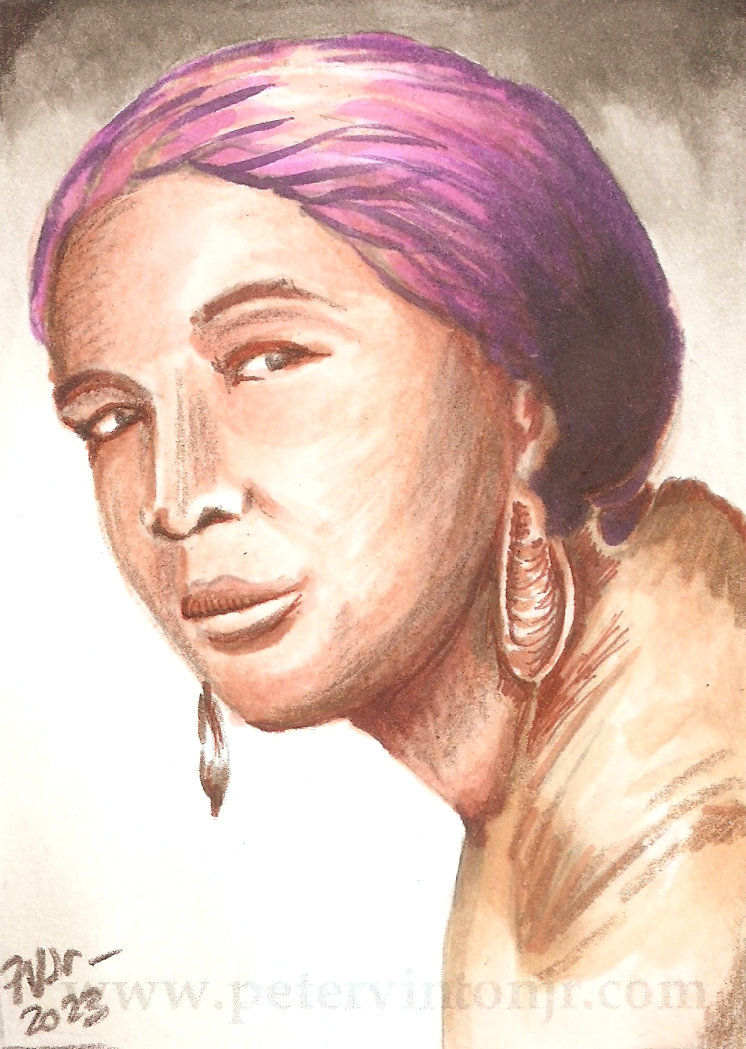Lesson 139:
Louise Meriwether
An ongoing illustrative history study
This piece originally posted 10/30/2023
Whilst her story and a half-sketched card were already on my "to-do" list, sadly this past month we bade farwell to author Louise Meriwether at the amazing age of 100. Born in 1923 New York, Meriwether grew up in Harlem during the Depression and --perhaps more significantly-- during the Harlem Renaissance. A voracious reader as a child, Meriwether majored in English at NYU, and then secured a Masters' in journalism from UCLA. Meriwether took a job as a freelance reporter in the early 1960's, and later as a story editor for Universal Studios --the first ever Black woman to be hired for such a role.
 Meriwether also wrote articles for the Los Angeles Sentinel, honing her craft by interviewing a number of prominent artists and writers during the mid-1960's, to include James Baldwin (Lesson #14 in this series), with whom she became close friends. In 1968 Meriwether was approached to be the editor-in-chief of a brand new magazine for Black women called Essence. She declined the offer and instead said would prefer to write for it; an article by her titled "Sensual Black Man, Do You Love Me?" featured in the May 1970 premiere issue. In 1968 she lent her voice to the Black Anti-Defamation Association (BADA), eloquently arguing against the screen-adaptation of William Styron's controversial novel Confessions of Nat Turner.
Meriwether also wrote articles for the Los Angeles Sentinel, honing her craft by interviewing a number of prominent artists and writers during the mid-1960's, to include James Baldwin (Lesson #14 in this series), with whom she became close friends. In 1968 Meriwether was approached to be the editor-in-chief of a brand new magazine for Black women called Essence. She declined the offer and instead said would prefer to write for it; an article by her titled "Sensual Black Man, Do You Love Me?" featured in the May 1970 premiere issue. In 1968 she lent her voice to the Black Anti-Defamation Association (BADA), eloquently arguing against the screen-adaptation of William Styron's controversial novel Confessions of Nat Turner.
Easily Meriwether's best-known work is also her first: 1970's Daddy Was a Number Runner, a coming-of-age account of life in Harlem during the Great Depression and the economic toll taken. With a foreword by Baldwin, this was the first novel to emerge from the Watts Writers' Workshop. Meriwether also made a point of writing a number of historical biographies aimed at younger readers; among these include the life stories of Rosa Parks, Dr. Daniel Hale Williams (Lesson #27 in this series), and Robert Smalls (Lesson #107 in this series).
Meriwether also spearheaded an effort to discourage Black artists, writers, and entertainers from visiting or performing in South Africa at the height of apartheid. A published brochure by Meriwether ultimately culminated in the observance of African Liberation Day in May of 1972, an event which was attended by key members of Congress including Ron Dellums (see Lesson #31 in this series), which directly informed his later drafting of the landmark Comprehensive Anti-Apartheid Act of 1986. Later in life Meriwether taught creative writing at Sarah Lawrence College and the University of Houston. In 2016 the Feminist Press created the Louise Meriwether First Book Prize, and in 2018 the 14th National Black Writers Conference presented Meriwether with Center for Black Literature lifetime achievement award, in recognition of her commitment to a lifetime of literary activism. Earlier this year she won the PEN Oakland Reginald Lockett Lifetime Acheivement Award.
Next page - Lesson 140: Carter G. Woodson
Return to www.petervintonjr.com Main Page
 Meriwether also wrote articles for the Los Angeles Sentinel, honing her craft by interviewing a number of prominent artists and writers during the mid-1960's, to include James Baldwin (Lesson #14 in this series), with whom she became close friends. In 1968 Meriwether was approached to be the editor-in-chief of a brand new magazine for Black women called Essence. She declined the offer and instead said would prefer to write for it; an article by her titled "Sensual Black Man, Do You Love Me?" featured in the May 1970 premiere issue. In 1968 she lent her voice to the Black Anti-Defamation Association (BADA), eloquently arguing against the screen-adaptation of William Styron's controversial novel Confessions of Nat Turner.
Meriwether also wrote articles for the Los Angeles Sentinel, honing her craft by interviewing a number of prominent artists and writers during the mid-1960's, to include James Baldwin (Lesson #14 in this series), with whom she became close friends. In 1968 Meriwether was approached to be the editor-in-chief of a brand new magazine for Black women called Essence. She declined the offer and instead said would prefer to write for it; an article by her titled "Sensual Black Man, Do You Love Me?" featured in the May 1970 premiere issue. In 1968 she lent her voice to the Black Anti-Defamation Association (BADA), eloquently arguing against the screen-adaptation of William Styron's controversial novel Confessions of Nat Turner.